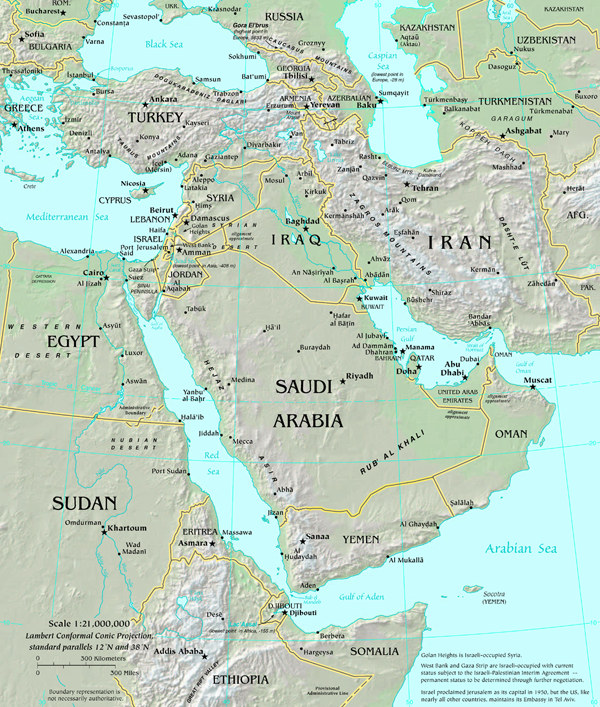 Israel's invasion of Gaza has managed to severely weaken Hamas, which appears to have not yet achieved Hezbollah-style capability, but the conflict has caused a shift in the geopolitical situation. The conflict had risked spreading to the rest of the Middle East after several rockets were fired from Southern Lebanon. Israel's decision not to launch a full-scale attack on Gaza city and depose Hamas likely prevented the conflict from erupting into a regional conflict. However, Israel remains intent on deposing Hamas through other means by having the reconstruction efforts led by Fatah in the hope it would get more support for the secular party in Gaza. Other regional powers are moving to back Fatah all in the hopes Hamas in its weakened state could fall, though a military takeover by Fatah seems unlikely.
Israel's invasion of Gaza has managed to severely weaken Hamas, which appears to have not yet achieved Hezbollah-style capability, but the conflict has caused a shift in the geopolitical situation. The conflict had risked spreading to the rest of the Middle East after several rockets were fired from Southern Lebanon. Israel's decision not to launch a full-scale attack on Gaza city and depose Hamas likely prevented the conflict from erupting into a regional conflict. However, Israel remains intent on deposing Hamas through other means by having the reconstruction efforts led by Fatah in the hope it would get more support for the secular party in Gaza. Other regional powers are moving to back Fatah all in the hopes Hamas in its weakened state could fall, though a military takeover by Fatah seems unlikely.However, Israel's decision also leads to the drawback that Hamas will now be able to improve its training and resupply. In this sense while Hamas did not show the capabilities of Hezbollah it may ultimately achieve the same aims. At the same time Hamas lacks the advantage Hezbollah enjoys in that a direct land route between it and Iran, the biggest likely source of assistance, can only travel through Israel.
The biggest impact of the conflict has been on the relations between Turkey and Israel. During the conflict Turkey's Prime Minister Recep Tayiip Erdogan accused Israel of committing "crimes against humanity" and said Allah would punish Israel. Erdogan even suggested Israel was putting itself on the path to self-destruction, the kind of rhetoric rivalled only by that of Iranian President Mahmoud Ahmadinejad. The Prime Minister was even refusing calls from Israeli Prime Minister Ehud Olmert during the conflict. Erdogan went so far as to call for Israel to be barred from the U.N. saying:
How is such a country, which totally ignores and does not implement resolutions of the U.N. Security Council, allowed to enter through the gates of the U.N.?Strain in Turkish-Israeli relations is impacting political relations in other ways as the Turkish Parliament has ended the inter-parliamentary friendship group with the Israeli Knesset. Visits to Turkey by Israeli officials have also been canceled. Jewish leaders and Jewish groups in the U.S. including the Anti-Defamation League and B'nai B'rith International are also concerned at increasing acts of anti-Semitism in Turkey. Such actions including attacks and protests could pose problems for Israeli relations. The overall decline in relations is naturally spreading to the business atmosphere between the two countries. Turkish travel agencies are seeing a 70% decline in traffic by tourists, Muslim businesses in Turkey are disassociating themselves from their Jewish counterparts, and over a dozen groups have been formed by Israelis to "ban Turkey" in response to Erdogan's comments about kicking Israel out of the U.N.
With Turkey moving further from Israel and closer to Iran the chances of Turkey allowing the arming of Hezbollah through Iran and Syria increases. With Hamas effectively out of the picture it is that sphere which stands to bring the most likely chance of renewed conflict. Hezbollah is saying it is prepared for Israeli action against them and Israel is receiving intelligence indicating the group is planning an attack in retaliation for the assassination of Imad Mugniyeh. Of particular interest is the one-year anniversary of the killing on February 12th. This happens to coincide with the Israeli elections on February 10th making it a period with strong potential for renewed conflict. If Likud should win the elections as most polls indicate it will it makes it highly likely that any attack would receive a more devastating response or that Israel would launch an attack on Hezbollah without a serious provocation.
It would also increase the chance of an Israeli strike against Iran. In this sense another pivitol development is incoming as Iran is looking for more uranium. Iran currently is said to have enough enriched uranium for 35 nuclear bombs. If Iran manages to get a major shipment of uranium or merely continues its progress on nuclear enrichment a Likud government will be more tempted to use force against Iran. One way or the other a major regional war in the Middle East is inevitable, it is only a question of time.
No comments:
Post a Comment